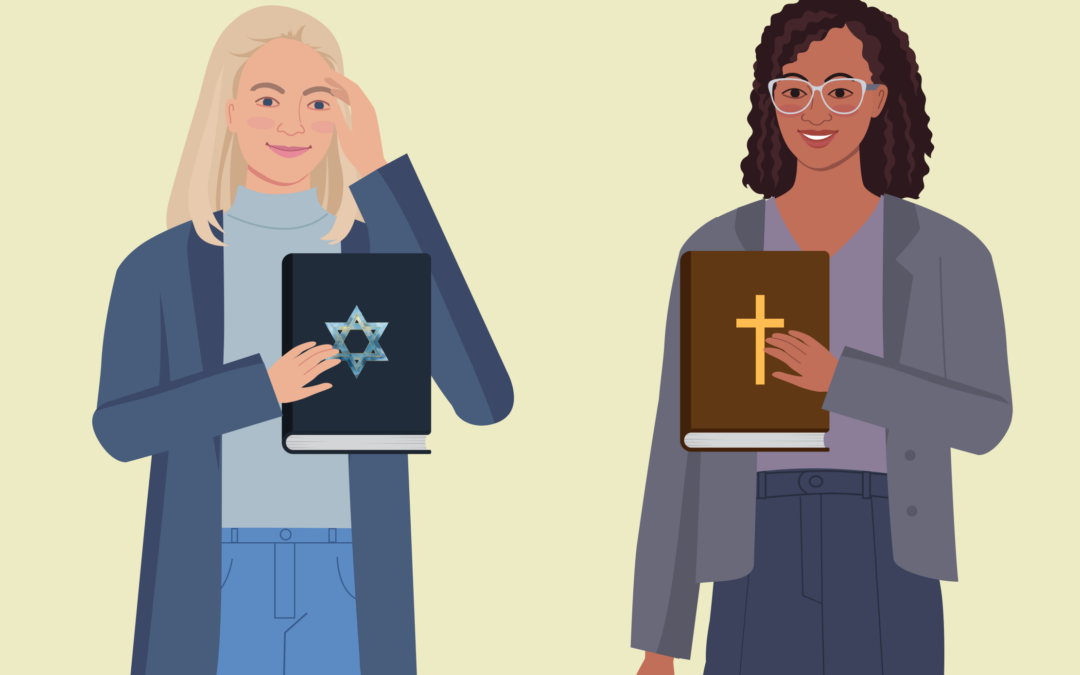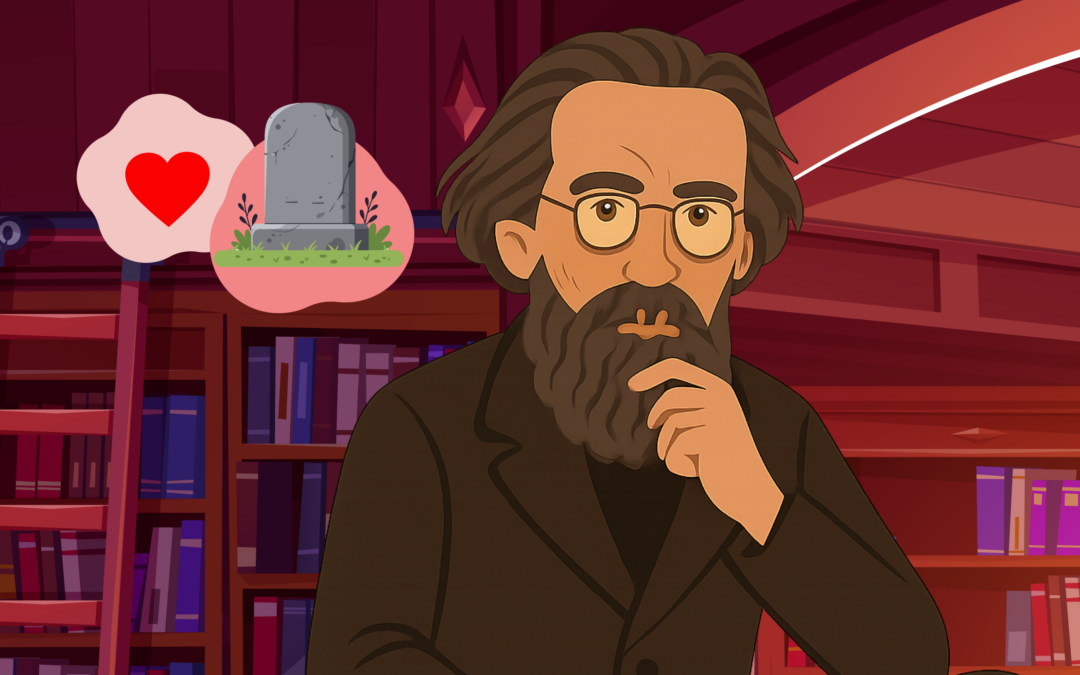Arts and Humanities
Explore Arts and Humanities

Dr Ori Soltes | The War Within: How Our Search for Meaning Can Unite or Divide Us
Religion has long helped people make sense of the world, but as Dr Ori Soltes argues in a recent paper, this guidance comes with deep complications. Even the word religion contains a puzzle. It stems from the Latin religio, meaning ‘to bind back’, which immediately raises the question of what we are trying to reconnect with in the first place. That act of binding back is ultimately tied to a search for meaning – a deep human need to understand our place in the world and how we relate to everything around us. Across history, people have turned to religion to navigate existence, mortality, and uncertainty. But trying to understand that source of meaning, and then expressing it through the limitations of human language, is where the real trouble begins.

Professor Robert Slesinski | Love, Death, and the Unity of All Things: Lev Karsavin’s Philosophy of “Liebestod”
In the chaos of early twentieth-century Russia, philosopher and historian Lev Karsavin (1882–1952) sought to reconcile faith, reason, and the depths of human emotion. Exiled and later imprisoned in the Soviet gulag, he developed a vision of “all-embracing unity,” where even love, suffering, and death reveal the presence of the divine. Professor Robert Slesinski’s book, Liebestod: The Philosophy of Lev Karsavin, explores this striking figure in Russian religious thought.

Dr Alexandra Anna Spalek – Dr Louise McNally | When Verbs Stretch: How Grammar Shapes Figurative Language
Language is full of creativity, but that creativity follows rules we don’t always notice. When we say a politician “swept the election” or that someone is “cut off from their friends,” we’re not talking about literal sweeping or cutting. Yet, somehow, these figurative uses feel natural. But do they follow the same grammatical logic as their literal counterparts? This is the puzzle that linguists Louise McNally, from Pompeu Fabra University in Barcelona, and Alexandra Anna Spalek, from the University of Oslo, set out to solve. Their research explores whether verbs carry their core grammatical features with them even when they shift into metaphorical territory.

How Chinese Words Transform When They Enter Mongolic Languages
When languages come into contact, they often borrow words from each other. But what happens if the donor-recipient language pairs are similar but set in different sociolinguistic contexts? Do they develop the same strategies, or do they find their own unique paths? Dr Julie Lefort of Ca’ Foscari University of Venice examines how Chinese adjectives are integrated into two Mongolic languages spoken in China: the Dörbed Mongolian Community Language (or ‘DMCL’ for short), spoken in Heilongjiang, and the Dongxiang language, spoken in Gansu.

Dr Tim Wharton | Understanding the Role of Emotions in Human Communication
Emotional communication is fundamental to human interaction, and plays a key role in the way humans connect with each another. However, precisely what emotions communicate and how they do so remains little understood. Dr Tim Wharton, a linguist based at the University of Brighton, is leading an ambitious research project that aims to change that. Drawing together insights from pragmatics – the study of utterance interpretation – linguistics, psychology, and neuroscience, his team’s work seeks to better understand the role of emotions in human communication.

Dr Cees Hamelink | Conflict is Inherent to Humanity, But How Can We Stop It Escalating into Violence?
Humans have a great capacity to care for the needs of others. Despite this, disagreements and disputes are an inherent part of human existence. So, what if the key to preventing conflicts from spiralling into mass violence isn’t avoiding disagreement altogether, but learning to communicate with compassion? New research from Dr Cees Hamelink at the University of Amsterdam suggests that, while we cannot eliminate human conflict, we can learn to tame its most destructive potential. His research challenges the widespread belief that conflicts can and should always be prevented, arguing instead that conflict often serves positive purposes in science, democracy, and personal development.
This video provides information to help you navigate emergency department visits to ensure your loved one receives effective care. The focus will be on how to manage seizure emergencies – either seizures arising for the first time or those caused by epilepsy.

Dr Monica Pauls | Understanding Collective Identity Among Youth Activists Online
Can collective identity among social movement actors develop online? Do social media platforms foster genuine relationships, or do meaningful connections require face-to-face interaction? New research by Dr Monica Pauls at Mount Royal University aimed to find out. Her latest study dives into the digital lives of youth activists to explore whether social media can foster a genuine sense of belonging and shared purpose.

Professor Kimani Nehusi | How Ancient Rituals Created Sacred Homelands
Land ownership disputes and displacement affect millions across Africa and its diaspora today, but understanding the profound spiritual relationship between African communities and their ancestral territories requires looking far back into history. Professor Kimani Nehusi at Temple University examines how African communities developed what he calls the ‘Afrikan Ancestral Land Complex’ – a distinctive collection of values, deep memory, knowledge, attitudes and rituals centered on land. His research focuses on ancient Kemet, known today as Egypt, where some of the earliest written records provide evidence of these practices dating back over 5,000 years.

Professor Penelope Corfield | Time-Space: Exploring How Humans Navigate Cosmic Existence
Yes, the clock is ticking away relentlessly! And yet today we live in an era when some philosophers claim that Time is merely an illusion. And certainly, many people casually dismiss all historical understanding as irrelevant. However, it’s time to rethink! We need to understand humanity’s place in time and space. And that’s particularly vital for addressing contemporary crises, especially climate change, which demands collective action based on both historical and scientific insights. Professor Penelope Corfield at Royal Holloway, University of London, has written a new book called Time-Space: We Are All in It Together. It offers a ground-breaking interdisciplinary exploration of how humans exist within the cosmic dimensions of Time and Space.

Professor Ben Baker | How Computational Methods Can Distinguish Between Hip-Hop Dance Styles
Dance plays a vital role across human cultures, with communities developing different styles for artistic expression. While experts can describe differences between dance genres in words, these descriptions are only meaningful to those with relevant background knowledge. In a recent study, Professor Ben Baker and colleagues at the University of Pennsylvania developed a computational system for analyzing and classifying bodily movement using 17 features, such as how expanded a dancer’s body is, or how frequently they make sharp movements.

How Humour Shaped Western Support for Ukraine
Russia’s invasion of Ukraine in February 2022 triggered an unprecedented wave of Western support. This was particularly apparent in the UK, where citizens held vigils and fundraisers, public buildings were lit in Ukrainian colours, while the government pledged over a hundred million pounds in humanitarian aid. According to Dr James Brassett and Dr Christopher Browning at the University of Warwick, this phenomenon went beyond mere sympathy, developing into ‘vicarious identification’ – where people gain a sense of identity and purpose by living through others’ experiences.

How COVID-19 Shaped Conservation Activism in Southern Africa
The COVID-19 pandemic influenced social structures and behaviours globally, reshaping how communities interact and mobilize. It also significantly transformed social movements across the world, creating new patterns of digital activism as essential tools during times of physical distancing and restricted movement. During this global shift, social media amplified indigenous voices in conservation, but turning this digital momentum into real policy impact remains a challenge. Despite safeguarding 80% of global biodiversity, these communities are often excluded from environmental decision-making, underscoring the need for digital advocacy to support their rights and heritage.

Dr Ori Soltes | The War Within: How Our Search for Meaning Can Unite or Divide Us
Religion has long helped people make sense of the world, but as Dr Ori Soltes argues in a recent paper, this guidance comes with deep complications. Even the word religion contains a puzzle. It stems from the Latin religio, meaning ‘to bind back’, which immediately raises the question of what we are trying to reconnect with in the first place. That act of binding back is ultimately tied to a search for meaning – a deep human need to understand our place in the world and how we relate to everything around us. Across history, people have turned to religion to navigate existence, mortality, and uncertainty. But trying to understand that source of meaning, and then expressing it through the limitations of human language, is where the real trouble begins.

Professor Robert Slesinski | Love, Death, and the Unity of All Things: Lev Karsavin’s Philosophy of “Liebestod”
In the chaos of early twentieth-century Russia, philosopher and historian Lev Karsavin (1882–1952) sought to reconcile faith, reason, and the depths of human emotion. Exiled and later imprisoned in the Soviet gulag, he developed a vision of “all-embracing unity,” where even love, suffering, and death reveal the presence of the divine. Professor Robert Slesinski’s book, Liebestod: The Philosophy of Lev Karsavin, explores this striking figure in Russian religious thought.

Dr Alexandra Anna Spalek – Dr Louise McNally | When Verbs Stretch: How Grammar Shapes Figurative Language
Language is full of creativity, but that creativity follows rules we don’t always notice. When we say a politician “swept the election” or that someone is “cut off from their friends,” we’re not talking about literal sweeping or cutting. Yet, somehow, these figurative uses feel natural. But do they follow the same grammatical logic as their literal counterparts? This is the puzzle that linguists Louise McNally, from Pompeu Fabra University in Barcelona, and Alexandra Anna Spalek, from the University of Oslo, set out to solve. Their research explores whether verbs carry their core grammatical features with them even when they shift into metaphorical territory.

How Chinese Words Transform When They Enter Mongolic Languages
When languages come into contact, they often borrow words from each other. But what happens if the donor-recipient language pairs are similar but set in different sociolinguistic contexts? Do they develop the same strategies, or do they find their own unique paths? Dr Julie Lefort of Ca’ Foscari University of Venice examines how Chinese adjectives are integrated into two Mongolic languages spoken in China: the Dörbed Mongolian Community Language (or ‘DMCL’ for short), spoken in Heilongjiang, and the Dongxiang language, spoken in Gansu.

Dr Tim Wharton | Understanding the Role of Emotions in Human Communication
Emotional communication is fundamental to human interaction, and plays a key role in the way humans connect with each another. However, precisely what emotions communicate and how they do so remains little understood. Dr Tim Wharton, a linguist based at the University of Brighton, is leading an ambitious research project that aims to change that. Drawing together insights from pragmatics – the study of utterance interpretation – linguistics, psychology, and neuroscience, his team’s work seeks to better understand the role of emotions in human communication.

Dr Cees Hamelink | Conflict is Inherent to Humanity, But How Can We Stop It Escalating into Violence?
Humans have a great capacity to care for the needs of others. Despite this, disagreements and disputes are an inherent part of human existence. So, what if the key to preventing conflicts from spiralling into mass violence isn’t avoiding disagreement altogether, but learning to communicate with compassion? New research from Dr Cees Hamelink at the University of Amsterdam suggests that, while we cannot eliminate human conflict, we can learn to tame its most destructive potential. His research challenges the widespread belief that conflicts can and should always be prevented, arguing instead that conflict often serves positive purposes in science, democracy, and personal development.
This video provides information to help you navigate emergency department visits to ensure your loved one receives effective care. The focus will be on how to manage seizure emergencies – either seizures arising for the first time or those caused by epilepsy.

Dr Monica Pauls | Understanding Collective Identity Among Youth Activists Online
Can collective identity among social movement actors develop online? Do social media platforms foster genuine relationships, or do meaningful connections require face-to-face interaction? New research by Dr Monica Pauls at Mount Royal University aimed to find out. Her latest study dives into the digital lives of youth activists to explore whether social media can foster a genuine sense of belonging and shared purpose.

Professor Kimani Nehusi | How Ancient Rituals Created Sacred Homelands
Land ownership disputes and displacement affect millions across Africa and its diaspora today, but understanding the profound spiritual relationship between African communities and their ancestral territories requires looking far back into history. Professor Kimani Nehusi at Temple University examines how African communities developed what he calls the ‘Afrikan Ancestral Land Complex’ – a distinctive collection of values, deep memory, knowledge, attitudes and rituals centered on land. His research focuses on ancient Kemet, known today as Egypt, where some of the earliest written records provide evidence of these practices dating back over 5,000 years.

Professor Penelope Corfield | Time-Space: Exploring How Humans Navigate Cosmic Existence
Yes, the clock is ticking away relentlessly! And yet today we live in an era when some philosophers claim that Time is merely an illusion. And certainly, many people casually dismiss all historical understanding as irrelevant. However, it’s time to rethink! We need to understand humanity’s place in time and space. And that’s particularly vital for addressing contemporary crises, especially climate change, which demands collective action based on both historical and scientific insights. Professor Penelope Corfield at Royal Holloway, University of London, has written a new book called Time-Space: We Are All in It Together. It offers a ground-breaking interdisciplinary exploration of how humans exist within the cosmic dimensions of Time and Space.

Professor Ben Baker | How Computational Methods Can Distinguish Between Hip-Hop Dance Styles
Dance plays a vital role across human cultures, with communities developing different styles for artistic expression. While experts can describe differences between dance genres in words, these descriptions are only meaningful to those with relevant background knowledge. In a recent study, Professor Ben Baker and colleagues at the University of Pennsylvania developed a computational system for analyzing and classifying bodily movement using 17 features, such as how expanded a dancer’s body is, or how frequently they make sharp movements.

How Humour Shaped Western Support for Ukraine
Russia’s invasion of Ukraine in February 2022 triggered an unprecedented wave of Western support. This was particularly apparent in the UK, where citizens held vigils and fundraisers, public buildings were lit in Ukrainian colours, while the government pledged over a hundred million pounds in humanitarian aid. According to Dr James Brassett and Dr Christopher Browning at the University of Warwick, this phenomenon went beyond mere sympathy, developing into ‘vicarious identification’ – where people gain a sense of identity and purpose by living through others’ experiences.

How COVID-19 Shaped Conservation Activism in Southern Africa
The COVID-19 pandemic influenced social structures and behaviours globally, reshaping how communities interact and mobilize. It also significantly transformed social movements across the world, creating new patterns of digital activism as essential tools during times of physical distancing and restricted movement. During this global shift, social media amplified indigenous voices in conservation, but turning this digital momentum into real policy impact remains a challenge. Despite safeguarding 80% of global biodiversity, these communities are often excluded from environmental decision-making, underscoring the need for digital advocacy to support their rights and heritage.
Stay Up To Date With SciTube
